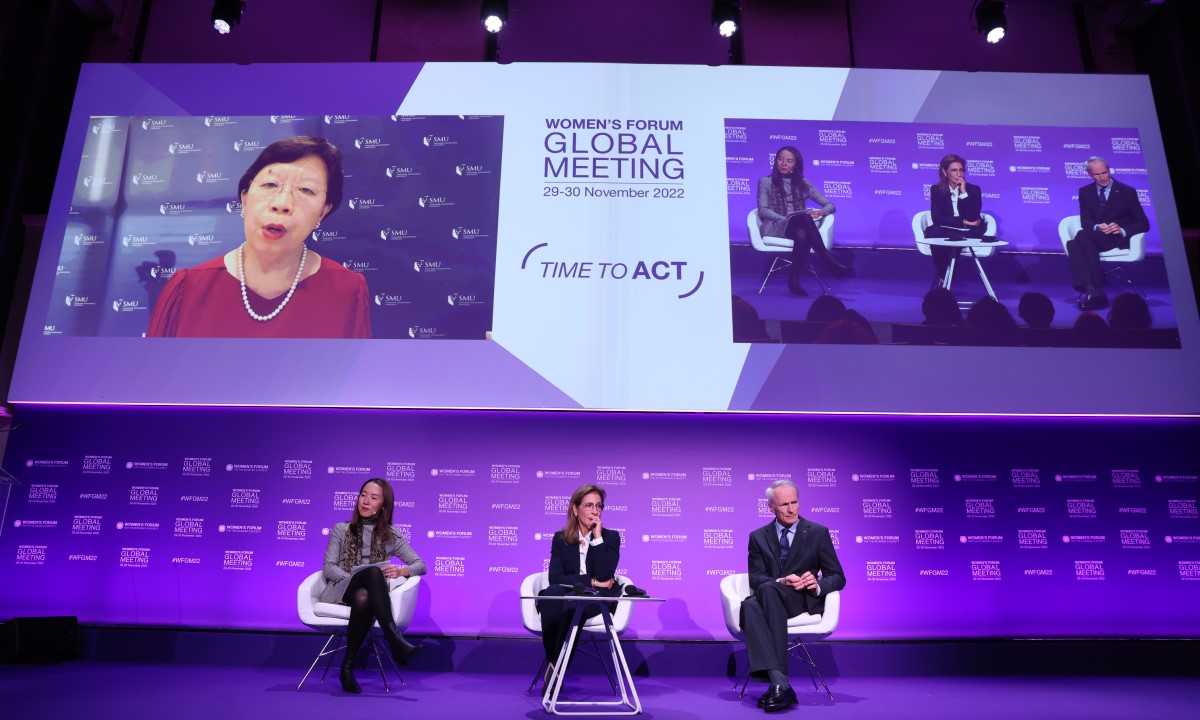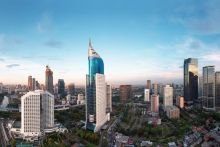Meeting the upskilling needs of women, beyond traditional education

Education is a fundamental right that should be accessible to everyone, no matter their circumstances. In order to navigate a world that is in flux, it is important to foster skills beyond traditional domain knowledge. SMU President Professor Lily Kong spoke about the education and skills we most need in an age of transformation during the panel discussion, Skills and Education in the Race for Humanity, at the 2022 Women’s Forum Global Meeting.
When it comes to long-term global sustainability, there is no doubt that our future depends on the level of knowledge we have as a society.
As such, during the 2022 Women's Forum Global Meeting, SMU President Professor Lily Kong explored how educational attainment and skill development are essential in building better communities. The panel — which also included Tanya Saadé Zeenny, Executive Officer, CMA CGM Group and President, CMA CGM Foundation; and Jean-Dominique Senard, President, Renault Group — discussed the importance of investing in young people's abilities so they can succeed later in life.
Moderated by Juliana Chan, CEO, Wildtype Media Group, the panel held on 29 November 2022 delved into the topic of Skills and Education in the Race for Humanity.
“As a mother of young children, one of whom is a girl, and a former university professor, it is safe to say that education is the great universal leveller,” remarked Ms Chan.
“And that's why governments, universities, foundations and corporations have done all they can to make education, affordable, accessible, and sometimes even free for those who most need them.”
But beyond a structured university education, Ms Chan raised the need for relevant skills that can unlock positive outcomes in health, climate and peace —the three pillars of the Women’s Forum.
Connecting multiple domains for holistic knowledge
As the world of work and education continues to rapidly evolve, it is becoming increasingly important for learners to gain skills that are in high demand and will open up opportunities with employers.
“Knowledge used to be about understanding a particular domain in great depth,” expressed Prof Kong.
“Students need to be able to make connections across different domains of knowledge. They need to integrate perspectives from different points of view. And that integration is so-important a skill that we mustn't leave to fate and chance.”
She stressed the importance of preparing students for the future through multiple domains of knowledge, so as to draw meaningful correlations which can often lead to groundbreaking advances and creative solutions not previously thought possible.
Solving problems out of the box
With rising digitalisation and economic upheaval, organisations are faced with unprecedented levels of volatility, uncertainty, complexity and ambiguity. Because today's disruptor will be tomorrow's disrupted business model, staying ahead requires innovative solutions to everyday challenges.
“Critical thinking and creative problem-solving skills are really important,” elaborated Prof Kong.
“You’re able to stare a problem in the face and say, ‘well, this is how I'm going to go about unpacking it, deconstructing the issues, and to then begin to think about possible solutions’.”
Further, Prof Kong highlighted the importance of interpersonal skills in a day and age when the ability to “communicate, persuade, cajole, make one's position clear” has been weakened by an overreliance on digital devices.
This urgent need for meaningful interactions underscores the importance of global citizenship. With modern technology providing unprecedented access to different countries and cultures, it has become clear that we must take seriously our responsibility towards one another if we are to build a better future together.
“The world is increasingly just going to need more and more understanding, not less of it, and the ability to navigate different cultures, to understand, to climb into someone else's shoes and walk around,” added Prof Kong.
This sense of inclusivity also extends to embracing the strengths of women in the workplace, as discussed by Mr Senard. Today, women have never been better placed to encourage autonomy and foster an empowering work culture. With an increasing number of women taking on leadership roles and achieving higher levels in the workplace, female professionals are well situated to set a precedent for driving professional success through self-determination.
“Women's empowerment is not only a matter of public policy, but the business world is very involved and plays a very major role,” said Ms Zeenny.
Through her organisation’s humanitarian and corporate social responsibility efforts, Ms Zeenny has observed the leadership quality of women in local communities. In fact, women form 40 per cent of humanitarian workers who provide frontline care during emergencies, wars and disasters.
Quality female education as a global enabler
As our world continues to evolve, one of the most powerful drivers of social change and economic development has been female education, pointed out Ms Zeenny. By investing in women’s and girls' educational opportunities, countries are positioning themselves for long-term success.
“What we've been very deliberate about doing is to ensure that we have scholarships available through philanthropy sources and so forth for students, particularly women,” explained Prof Kong.
“There are ring-fenced scholarships and bursaries for women with financial needs, so that if they have the potential, they do not have to worry about access to education.”
It is time for a new approach to education, one that takes into account the ever-changing needs of society and the individual. We must move beyond traditional domain knowledge if we are to provide relevant skills training that will help women navigate an increasingly complex world. Only then can we hope to create meaningful impact and achieve true gender parity.


